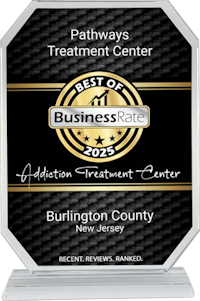Couples Therapy for Addiction in Burlington, New Jersey
Substance use often disrupts intimate relationships. Our couples therapy helps partners navigate addiction’s impact together, strengthening support, understanding, and shared goals in recovery. Start healing through couples therapy; call Pathways Treatment Center.
At our Burlington, New Jersey facility, we focus on outpatient addiction treatment, partial hospitalization, intensive outpatient programs, dual diagnosis care, and sober living to address the layers of addiction. Couples therapy adds another dimension to this approach by empowering partners to grow stronger together through the healing process. Together, recovery becomes not just an individual goal but a shared pathway to health and connection.

Understanding Addiction and Its Impact on Relationships
Addiction is a complex condition that often leads to emotional and physical strain on relationships. It can cause misunderstandings, resentment, and a breakdown of trust. Partners may feel helpless or frustrated as they watch their loved one struggle, leading to a cycle of conflict and withdrawal.
When one partner is addicted, the emotional toll can be overwhelming. The partner who is not struggling with addiction may feel isolated, anxious, or angry. They might worry about their loved one’s health and safety, leading to feelings of helplessness. This emotional burden can create a rift in the relationship, making it difficult to communicate effectively.
Additionally, the partner dealing with addiction may experience shame and guilt, which can further complicate their ability to connect with their loved one. These feelings can lead to withdrawal, making it hard for both partners to express their needs and emotions. The impact of addiction can extend beyond the couple, affecting family dynamics and friendships, as loved ones may also feel the strain of the situation. Children, in particular, can be deeply affected by a parent’s addiction, leading to feelings of insecurity and fear, which can manifest in their own behavioral issues and emotional struggles.
Effective communication is vital in any relationship, but addiction can hinder this process. The partner struggling with addiction may become defensive or evasive, while the other partner might express frustration or desperation. This communication breakdown can lead to misunderstandings and further conflict.
Couples therapy provides a safe space for partners to express their feelings and concerns without judgment. A trained therapist can help facilitate these conversations, encouraging both partners to listen and understand each other’s perspectives. Establishing these open lines of communication can be a critical step in rebuilding trust and intimacy. Techniques such as active listening, where partners focus entirely on what the other is saying without planning their response, can foster a deeper understanding of each other’s experiences. This process not only aids in healing but also empowers both partners to work collaboratively towards recovery and a healthier relationship dynamic.
The Role of Couples Therapy in Recovery
Couples therapy can be a powerful tool in the recovery process. It not only addresses the addiction itself but also focuses on the relationship dynamics that may contribute to or result from the addiction. By working together, couples can rebuild trust and strengthen their bond.
One of the primary goals of couples therapy is to create a supportive environment for both partners. This involves recognizing the challenges of addiction while also celebrating progress in recovery. A therapist can help couples establish healthy communication patterns and coping strategies, allowing them to support each other effectively.
In therapy, partners learn to express their feelings openly and honestly. This transparency fosters a sense of safety and understanding, which is crucial for healing. When both partners feel heard and validated, they are more likely to work together toward recovery. The therapist often introduces exercises that encourage vulnerability, such as sharing personal stories or fears, which can deepen emotional connections and promote empathy. As couples navigate these discussions, they often discover underlying issues that may have been overlooked, leading to a more comprehensive understanding of each other’s experiences.
Another essential aspect of couples therapy is setting boundaries and expectations. The partner struggling with addiction may need to establish limits regarding their behavior, while the other partner may need to articulate what they can and cannot tolerate. These boundaries help create a healthier relationship dynamic.
Through addiction therapy services, couples can develop a mutual understanding of what recovery looks like and what each partner needs to feel secure. This clarity can prevent misunderstandings and foster a sense of teamwork in the recovery journey. Additionally, couples may explore the importance of accountability, where both partners agree to check in with each other regularly about their feelings and progress. This ongoing dialogue not only reinforces commitment but also encourages both partners to remain engaged in the recovery process, ensuring that neither feels isolated or unsupported.

Techniques Used in Couples Therapy for Addiction
Therapists use various techniques in couples therapy to address addiction and its impact on relationships. These methods are designed to facilitate communication, enhance understanding, and promote healing.
Emotionally Focused Therapy (EFT)
Emotionally Focused Therapy (EFT) is a popular approach in couples therapy, particularly for those dealing with addiction. This technique focuses on identifying and expressing emotions that may be underlying the addiction. By exploring these feelings, couples can better understand each other and strengthen their emotional connection.
EFT encourages partners to share their vulnerabilities, which can help rebuild trust and intimacy. This approach is particularly effective for couples, as it emphasizes the importance of emotional bonding in overcoming challenges.
Behavioral Couples Therapy (BCT)
Behavioral Couples Therapy (BCT) is another effective method for addressing addiction in relationships. BCT focuses on changing behaviors that contribute to addiction and relationship issues. This approach helps couples identify patterns of behavior that may be harmful and work together to replace them with healthier alternatives.
Through BCT, couples can learn to support each other’s recovery efforts. This might involve creating a shared plan for sobriety, participating in activities that promote a healthy lifestyle, or developing strategies for coping with triggers.

Building Trust and Intimacy in Recovery
Rebuilding trust and intimacy is crucial for couples navigating addiction recovery. The journey can be challenging, but with commitment and effort, couples can emerge stronger than before.
Trust is often shattered in relationships affected by addiction. The partner struggling with addiction may have engaged in behaviors that hurt their loved one, such as lying or neglecting responsibilities. Rebuilding this trust takes time, patience, and consistent effort.
Couples therapy can provide a structured environment for addressing these trust issues. Partners can work through their feelings of betrayal and learn how to communicate their needs moving forward. A therapist can guide this process, helping both partners understand the importance of honesty and accountability in rebuilding their relationship.
Intimacy is not just physical; it also involves emotional closeness and connection. Couples therapy can help partners explore ways to enhance their intimacy, which may have been affected by addiction. This can include discussing desires, fears, and vulnerabilities.
Therapists often encourage couples to engage in activities that promote bonding, such as spending quality time together, exploring new interests, or practicing affection. These shared experiences can help rekindle the emotional connection that may have been lost during the addiction struggle.
Challenges in Couples Therapy for Addiction
While couples therapy can be incredibly beneficial, it is not without its challenges. Both partners must be willing to engage in the process and commit to their recovery journey.
One of the primary challenges in couples therapy for addiction is resistance. The partner struggling with drug and alcohol addiction may feel defensive or reluctant to participate. This resistance can stem from fear of judgment or a lack of understanding about how therapy can help.
It is essential for the partner who is not struggling with addiction to approach the situation with empathy and patience. Encouraging open dialogue about the benefits of therapy can help alleviate some of this resistance and foster a willingness to engage in the process.
Relapse is a common part of the recovery process, and it can create additional challenges in couples therapy. When one partner relapses, it can lead to feelings of disappointment, anger, or hopelessness in the other partner. Addressing these feelings in therapy is crucial for maintaining a healthy relationship.
Therapists can help couples develop strategies for managing setbacks and maintaining open lines of communication during difficult times. Recognizing that recovery is a process with ups and downs can help both partners approach challenges with compassion and understanding.
The Path to Healing Together
Couples therapy for addiction offers a valuable opportunity for partners to heal and grow together. By addressing the emotional and relational aspects of addiction, couples can strengthen their bond and support each other in recovery. While the journey may be challenging, the rewards of a healthier, more connected relationship are worth the effort.
As partners navigate the complexities of addiction and recovery, they can emerge with a deeper understanding of each other and a renewed commitment to their relationship. With the right support and dedication, couples can transform their struggles into a powerful story of resilience and love.
If you and your partner are ready to strengthen your relationship through recovery, Pathways Treatment Center is here to support you every step of the way. Our compassionate team offers personalized treatment plans to address the unique challenges of addiction. We provide a comprehensive approach to healing, focusing on individual, group, family, and couples therapy to equip you with the tools for lasting recovery. Contact us today to start on the path toward a healthier, more connected life together.



